By Yonathan Listik · Tuesday, April 23, 2013
As an occasional feature on TELOSscope, we highlight a past Telos article whose critical insights continue to illuminate our thinking and challenge our assumptions. Today, Yonathan Listik looks at Cornelius Castoriadis’s “Socialism and Autonomous Society,” from Telos 43 (Spring 1980).
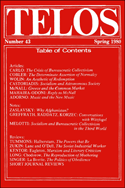 Cornelius Castoriadis’s opening line in “Socialism and Autonomous Society”—”Henceforth, the terms ‘socialism’ and ‘communism’ will have to be abandoned”—clearly indicate that he is breaking with orthodox Marxism. But one must not rush to a conclusion since upon closer inspection the dissonances are not that relevant to Marx’s overall project as presented by Castoriadis. His criticism of notions such as the “dictatorship of the proletariat” could automatically place him outside the Marxist discourse. Nevertheless he manages to illustrate, even within orthodox Marxism, the minor position of canonical notions, compared to Marx’s essential project of an autonomous society: a society composed of free and sovereign people. Cornelius Castoriadis’s opening line in “Socialism and Autonomous Society”—”Henceforth, the terms ‘socialism’ and ‘communism’ will have to be abandoned”—clearly indicate that he is breaking with orthodox Marxism. But one must not rush to a conclusion since upon closer inspection the dissonances are not that relevant to Marx’s overall project as presented by Castoriadis. His criticism of notions such as the “dictatorship of the proletariat” could automatically place him outside the Marxist discourse. Nevertheless he manages to illustrate, even within orthodox Marxism, the minor position of canonical notions, compared to Marx’s essential project of an autonomous society: a society composed of free and sovereign people.
Continue reading →
By J. F. Dorahy · Tuesday, January 15, 2013 As an occasional feature on TELOSscope, we highlight a past Telos article whose critical insights continue to illuminate our thinking and challenge our assumptions. Today, J. F. Dorahy looks at Agnes Heller’s “The Marxist Theory of Revolution and the Revolution of Everyday Life,” from Telos 6 (Fall 1970).
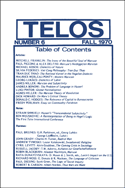 The category of “everyday life” is a relatively new addition to the critical framework of Marxism. Since it was formally introduced by the French theorist Henri Lefèbvre (Critique de la vie quotidienne I, 1947; The Critique of Everyday Life, 1991), the critique of everyday life emerged in the post-1945 period as a response to the continuing stability of late capitalism and the integration of formerly radical elements of society within its logic of containment. From within the orbit of “actually existing socialism,” Agnes Heller’s critical anthropology of everyday life illuminates the integrative tendencies of both “great systems” during the Cold War via the prism of the alienated personality. While “The Marxist Theory of Revolution and the Revolution of Everyday Life” touches on numerous practical issues confronting the radical political movements on the late-1960s—including analysis of the ideological relevance of Che Guevara and the role of the sexual liberation movement in the formation non-alienated communities—its greatest and most enduring aspect is Heller’s focused and concise delineation of the phenomenology of personhood in the world-historical epoch of alienation. The category of “everyday life” is a relatively new addition to the critical framework of Marxism. Since it was formally introduced by the French theorist Henri Lefèbvre (Critique de la vie quotidienne I, 1947; The Critique of Everyday Life, 1991), the critique of everyday life emerged in the post-1945 period as a response to the continuing stability of late capitalism and the integration of formerly radical elements of society within its logic of containment. From within the orbit of “actually existing socialism,” Agnes Heller’s critical anthropology of everyday life illuminates the integrative tendencies of both “great systems” during the Cold War via the prism of the alienated personality. While “The Marxist Theory of Revolution and the Revolution of Everyday Life” touches on numerous practical issues confronting the radical political movements on the late-1960s—including analysis of the ideological relevance of Che Guevara and the role of the sexual liberation movement in the formation non-alienated communities—its greatest and most enduring aspect is Heller’s focused and concise delineation of the phenomenology of personhood in the world-historical epoch of alienation.
Continue reading →
By James Santucci · Tuesday, December 18, 2012 As an occasional feature on TELOSscope, we highlight a past Telos article whose critical insights continue to illuminate our thinking and challenge our assumptions. Today, James Santucci looks at Karel Kosík’s “Our Present Crisis” from Telos 13 (Fall 1972).
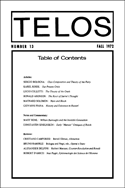 Karel Kosík’s story begins with the end of a statue. In 1962, a granite statue of Stalin that had been begun in 1955 was completed only to be torn down several months later. For Kosík, the statue, “designed to last forever,” perfectly represented the provisionalism and nihilism of modern times. It laid bare the inescapable tension between living peacefully in social life and the animal brutality that occasionally became necessary. When the statue was torn down, the base was left behind. In Kosík’s time, there were plans to transform the space into a garden restaurant. The restaurant’s relationship to its past would be complicated, but plans were scrapped, which saved any Prague tourists from the awkwardness of “Would you like to see our drink menu while you contemplate what it means to live under threat of random and instantaneous erasure?” Karel Kosík’s story begins with the end of a statue. In 1962, a granite statue of Stalin that had been begun in 1955 was completed only to be torn down several months later. For Kosík, the statue, “designed to last forever,” perfectly represented the provisionalism and nihilism of modern times. It laid bare the inescapable tension between living peacefully in social life and the animal brutality that occasionally became necessary. When the statue was torn down, the base was left behind. In Kosík’s time, there were plans to transform the space into a garden restaurant. The restaurant’s relationship to its past would be complicated, but plans were scrapped, which saved any Prague tourists from the awkwardness of “Would you like to see our drink menu while you contemplate what it means to live under threat of random and instantaneous erasure?”
Continue reading →
By Yonathan Listik · Tuesday, November 27, 2012 As an occasional feature on TELOSscope, we highlight a past Telos article whose critical insights continue to illuminate our thinking and challenge our assumptions. Today, Yonathan Listik looks at Georg Lukács’s “The Old Culture and the New Culture” from Telos 5 (Spring 1970).
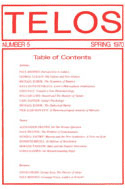 It would be simplistic to argue that behind the Marxist critiques of capitalist society there was only an objective intention simply to improve its effectiveness and avoid the political complications found in capitalist society. Despite its strict scientific tone, Marxism still carries a heavily moral intention. This is what Georg Lukács comes to argue in this essay on culture. In his analysis of capitalist cultural structure and its many differences from capitalist reality, Lukács points to what he regards as the ultimate goal behind communism: a new cultural order. It would be simplistic to argue that behind the Marxist critiques of capitalist society there was only an objective intention simply to improve its effectiveness and avoid the political complications found in capitalist society. Despite its strict scientific tone, Marxism still carries a heavily moral intention. This is what Georg Lukács comes to argue in this essay on culture. In his analysis of capitalist cultural structure and its many differences from capitalist reality, Lukács points to what he regards as the ultimate goal behind communism: a new cultural order.
Continue reading →
By Sevgi Doğan · Monday, November 26, 2012 This paper was presented at Telos in Europe: The L’Aquila Conference, held on September 7-9, 2012, in L’Aquila, Italy.
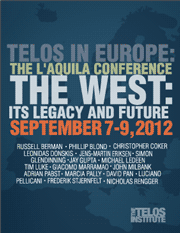 The argument of this paper is inspired by the actual problem of the individual in the modern state, in other words, the relationship between the political life and the individual, or the relation of the individual with politics. The thesis would claim that the individual as one of the fundamental features of modern times does not exist—or is not considered—as political agent although the modern political institution is based on the existence of the individual with its economic, social, and political rights. In this context, the individual exists only as consumer both for him/herself and for another (capitalist) and as a producer for another (capitalist) but not as a creator for him/herself. Marx talks about the production and consumption dialectic in the “Introduction” to Grundrisse (1858, published 1939). In this context a brief survey is presented here of some well-known early writings of Marx in an effort to outline how this dialectic is revealed for the difference between Marx’s and Hegel’s philosophical perspectives of the individual existence. The statement claiming that Marx does not discuss the concept of individual as Hegel does is a delusion. The argument of this paper is inspired by the actual problem of the individual in the modern state, in other words, the relationship between the political life and the individual, or the relation of the individual with politics. The thesis would claim that the individual as one of the fundamental features of modern times does not exist—or is not considered—as political agent although the modern political institution is based on the existence of the individual with its economic, social, and political rights. In this context, the individual exists only as consumer both for him/herself and for another (capitalist) and as a producer for another (capitalist) but not as a creator for him/herself. Marx talks about the production and consumption dialectic in the “Introduction” to Grundrisse (1858, published 1939). In this context a brief survey is presented here of some well-known early writings of Marx in an effort to outline how this dialectic is revealed for the difference between Marx’s and Hegel’s philosophical perspectives of the individual existence. The statement claiming that Marx does not discuss the concept of individual as Hegel does is a delusion.
Continue reading →
By Marcia Pally · Tuesday, February 7, 2012 Marcia Pally’s “Non-Market Motives at Work in the Market: ‘New Evangelicals’ in Civil Society in the United States and Overseas” appears in Telos 157 (Winter 2011). Read the full version online at the TELOS Online website, or purchase a print copy of the issue here.
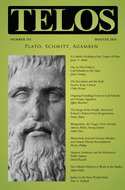 Since the 2008 global financial crisis, a reassessment of our global market system seems to be afoot: if neoliberalism (too much market) yields the Great Recession, if socialist planned markets (not enough market) produce the failed economies of the former Soviet bloc, and if social-market combinations (too much market centralization) progress toward the high-cost and slow growth of Western Europe, what are better options? This essay describes the economic justice efforts of “new evangelicals,” those who have left the right for an anti-consumerist, anti-militarist focus on economic justice, environmental protection, immigration reform, and racial/religious reconciliation. It reviews the history of U.S. evangelicalism, describes the current shift away from the religious right, and details “new evangelical” common-good capitalism, where the benefits of capitalist markets are preserved yet embedded in—and constrained by—common-good values. This is not alms-giving but the restructuring of opportunity for those whom the market has failed—not an undoing of market relations but a radical change of relations within the market. The undergirding religious doctrines and case studies, both domestic and overseas, are described. Against the view that linking markets to common-good principles is romantic or useless, “new evangelicals” are already on the ground, doing just this sort of linking. Since the 2008 global financial crisis, a reassessment of our global market system seems to be afoot: if neoliberalism (too much market) yields the Great Recession, if socialist planned markets (not enough market) produce the failed economies of the former Soviet bloc, and if social-market combinations (too much market centralization) progress toward the high-cost and slow growth of Western Europe, what are better options? This essay describes the economic justice efforts of “new evangelicals,” those who have left the right for an anti-consumerist, anti-militarist focus on economic justice, environmental protection, immigration reform, and racial/religious reconciliation. It reviews the history of U.S. evangelicalism, describes the current shift away from the religious right, and details “new evangelical” common-good capitalism, where the benefits of capitalist markets are preserved yet embedded in—and constrained by—common-good values. This is not alms-giving but the restructuring of opportunity for those whom the market has failed—not an undoing of market relations but a radical change of relations within the market. The undergirding religious doctrines and case studies, both domestic and overseas, are described. Against the view that linking markets to common-good principles is romantic or useless, “new evangelicals” are already on the ground, doing just this sort of linking.
Continue reading →
|
|
 Cornelius Castoriadis’s opening line in “Socialism and Autonomous Society”—”Henceforth, the terms ‘socialism’ and ‘communism’ will have to be abandoned”—clearly indicate that he is breaking with orthodox Marxism. But one must not rush to a conclusion since upon closer inspection the dissonances are not that relevant to Marx’s overall project as presented by Castoriadis. His criticism of notions such as the “dictatorship of the proletariat” could automatically place him outside the Marxist discourse. Nevertheless he manages to illustrate, even within orthodox Marxism, the minor position of canonical notions, compared to Marx’s essential project of an autonomous society: a society composed of free and sovereign people.
Cornelius Castoriadis’s opening line in “Socialism and Autonomous Society”—”Henceforth, the terms ‘socialism’ and ‘communism’ will have to be abandoned”—clearly indicate that he is breaking with orthodox Marxism. But one must not rush to a conclusion since upon closer inspection the dissonances are not that relevant to Marx’s overall project as presented by Castoriadis. His criticism of notions such as the “dictatorship of the proletariat” could automatically place him outside the Marxist discourse. Nevertheless he manages to illustrate, even within orthodox Marxism, the minor position of canonical notions, compared to Marx’s essential project of an autonomous society: a society composed of free and sovereign people.  The category of “everyday life” is a relatively new addition to the critical framework of Marxism. Since it was formally introduced by the French theorist Henri Lefèbvre (Critique de la vie quotidienne I, 1947; The Critique of Everyday Life, 1991), the critique of everyday life emerged in the post-1945 period as a response to the continuing stability of late capitalism and the integration of formerly radical elements of society within its logic of containment. From within the orbit of “actually existing socialism,” Agnes Heller’s critical anthropology of everyday life illuminates the integrative tendencies of both “great systems” during the Cold War via the prism of the alienated personality. While “The Marxist Theory of Revolution and the Revolution of Everyday Life” touches on numerous practical issues confronting the radical political movements on the late-1960s—including analysis of the ideological relevance of Che Guevara and the role of the sexual liberation movement in the formation non-alienated communities—its greatest and most enduring aspect is Heller’s focused and concise delineation of the phenomenology of personhood in the world-historical epoch of alienation.
The category of “everyday life” is a relatively new addition to the critical framework of Marxism. Since it was formally introduced by the French theorist Henri Lefèbvre (Critique de la vie quotidienne I, 1947; The Critique of Everyday Life, 1991), the critique of everyday life emerged in the post-1945 period as a response to the continuing stability of late capitalism and the integration of formerly radical elements of society within its logic of containment. From within the orbit of “actually existing socialism,” Agnes Heller’s critical anthropology of everyday life illuminates the integrative tendencies of both “great systems” during the Cold War via the prism of the alienated personality. While “The Marxist Theory of Revolution and the Revolution of Everyday Life” touches on numerous practical issues confronting the radical political movements on the late-1960s—including analysis of the ideological relevance of Che Guevara and the role of the sexual liberation movement in the formation non-alienated communities—its greatest and most enduring aspect is Heller’s focused and concise delineation of the phenomenology of personhood in the world-historical epoch of alienation.  Karel Kosík’s story begins with the end of a statue. In 1962, a granite statue of Stalin that had been begun in 1955 was completed only to be torn down several months later. For Kosík, the statue, “designed to last forever,” perfectly represented the provisionalism and nihilism of modern times. It laid bare the inescapable tension between living peacefully in social life and the animal brutality that occasionally became necessary. When the statue was torn down, the base was left behind. In Kosík’s time, there were plans to transform the space into a garden restaurant. The restaurant’s relationship to its past would be complicated, but plans were scrapped, which saved any Prague tourists from the awkwardness of “Would you like to see our drink menu while you contemplate what it means to live under threat of random and instantaneous erasure?”
Karel Kosík’s story begins with the end of a statue. In 1962, a granite statue of Stalin that had been begun in 1955 was completed only to be torn down several months later. For Kosík, the statue, “designed to last forever,” perfectly represented the provisionalism and nihilism of modern times. It laid bare the inescapable tension between living peacefully in social life and the animal brutality that occasionally became necessary. When the statue was torn down, the base was left behind. In Kosík’s time, there were plans to transform the space into a garden restaurant. The restaurant’s relationship to its past would be complicated, but plans were scrapped, which saved any Prague tourists from the awkwardness of “Would you like to see our drink menu while you contemplate what it means to live under threat of random and instantaneous erasure?”  It would be simplistic to argue that behind the Marxist critiques of capitalist society there was only an objective intention simply to improve its effectiveness and avoid the political complications found in capitalist society. Despite its strict scientific tone, Marxism still carries a heavily moral intention. This is what Georg Lukács comes to argue in this essay on culture. In his analysis of capitalist cultural structure and its many differences from capitalist reality, Lukács points to what he regards as the ultimate goal behind communism: a new cultural order.
It would be simplistic to argue that behind the Marxist critiques of capitalist society there was only an objective intention simply to improve its effectiveness and avoid the political complications found in capitalist society. Despite its strict scientific tone, Marxism still carries a heavily moral intention. This is what Georg Lukács comes to argue in this essay on culture. In his analysis of capitalist cultural structure and its many differences from capitalist reality, Lukács points to what he regards as the ultimate goal behind communism: a new cultural order.  The argument of this paper is inspired by the actual problem of the individual in the modern state, in other words, the relationship between the political life and the individual, or the relation of the individual with politics. The thesis would claim that the individual as one of the fundamental features of modern times does not exist—or is not considered—as political agent although the modern political institution is based on the existence of the individual with its economic, social, and political rights. In this context, the individual exists only as consumer both for him/herself and for another (capitalist) and as a producer for another (capitalist) but not as a creator for him/herself. Marx talks about the production and consumption dialectic in the “Introduction” to Grundrisse (1858, published 1939). In this context a brief survey is presented here of some well-known early writings of Marx in an effort to outline how this dialectic is revealed for the difference between Marx’s and Hegel’s philosophical perspectives of the individual existence. The statement claiming that Marx does not discuss the concept of individual as Hegel does is a delusion.
The argument of this paper is inspired by the actual problem of the individual in the modern state, in other words, the relationship between the political life and the individual, or the relation of the individual with politics. The thesis would claim that the individual as one of the fundamental features of modern times does not exist—or is not considered—as political agent although the modern political institution is based on the existence of the individual with its economic, social, and political rights. In this context, the individual exists only as consumer both for him/herself and for another (capitalist) and as a producer for another (capitalist) but not as a creator for him/herself. Marx talks about the production and consumption dialectic in the “Introduction” to Grundrisse (1858, published 1939). In this context a brief survey is presented here of some well-known early writings of Marx in an effort to outline how this dialectic is revealed for the difference between Marx’s and Hegel’s philosophical perspectives of the individual existence. The statement claiming that Marx does not discuss the concept of individual as Hegel does is a delusion.  Since the 2008 global financial crisis, a reassessment of our global market system seems to be afoot: if neoliberalism (too much market) yields the Great Recession, if socialist planned markets (not enough market) produce the failed economies of the former Soviet bloc, and if social-market combinations (too much market centralization) progress toward the high-cost and slow growth of Western Europe, what are better options? This essay describes the economic justice efforts of “new evangelicals,” those who have left the right for an anti-consumerist, anti-militarist focus on economic justice, environmental protection, immigration reform, and racial/religious reconciliation. It reviews the history of U.S. evangelicalism, describes the current shift away from the religious right, and details “new evangelical” common-good capitalism, where the benefits of capitalist markets are preserved yet embedded in—and constrained by—common-good values. This is not alms-giving but the restructuring of opportunity for those whom the market has failed—not an undoing of market relations but a radical change of relations within the market. The undergirding religious doctrines and case studies, both domestic and overseas, are described. Against the view that linking markets to common-good principles is romantic or useless, “new evangelicals” are already on the ground, doing just this sort of linking.
Since the 2008 global financial crisis, a reassessment of our global market system seems to be afoot: if neoliberalism (too much market) yields the Great Recession, if socialist planned markets (not enough market) produce the failed economies of the former Soviet bloc, and if social-market combinations (too much market centralization) progress toward the high-cost and slow growth of Western Europe, what are better options? This essay describes the economic justice efforts of “new evangelicals,” those who have left the right for an anti-consumerist, anti-militarist focus on economic justice, environmental protection, immigration reform, and racial/religious reconciliation. It reviews the history of U.S. evangelicalism, describes the current shift away from the religious right, and details “new evangelical” common-good capitalism, where the benefits of capitalist markets are preserved yet embedded in—and constrained by—common-good values. This is not alms-giving but the restructuring of opportunity for those whom the market has failed—not an undoing of market relations but a radical change of relations within the market. The undergirding religious doctrines and case studies, both domestic and overseas, are described. Against the view that linking markets to common-good principles is romantic or useless, “new evangelicals” are already on the ground, doing just this sort of linking. 

